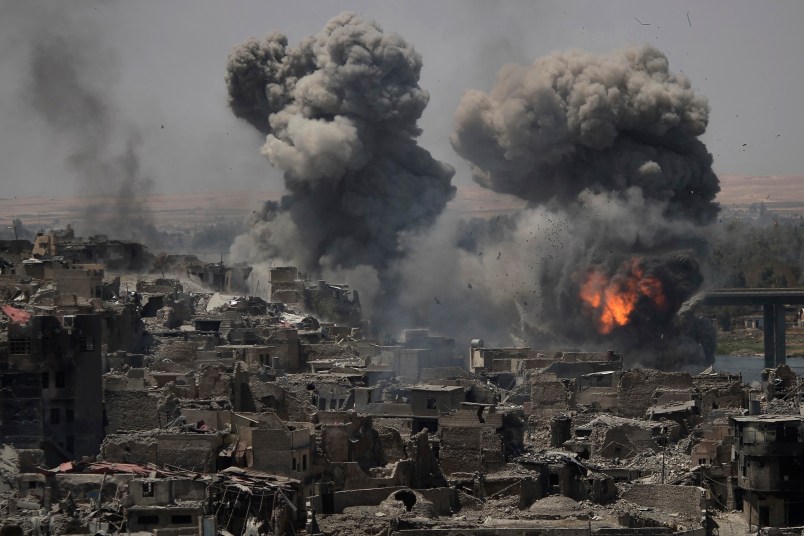MOSUL, Iraq (AP) — Sporadic clashes erupted in Mosul on Tuesday, a day after Iraq’s prime minister declared “total victory” over the Islamic State group, with several airstrikes hitting the Old City neighborhood that was the scene of the fierce battle’s final days.
Plumes of smoke rose into the air as IS mortar shells landed near Iraqi positions and heavy gunfire could be heard on the western edge of the Old City.
At times heavy, the clashes underscored the dangers still posed by the militants after Iraqi forces announced they retook full control of Mosul, the country’s second-largest city, three years after it was seized by extremists bent on building a global caliphate.
Meanwhile, Amnesty International warned in a report released Tuesday that the conflict in Mosul has created a “civilian catastrophe,” with the extremists carrying out forced displacement, summary killings and using civilians as human shields.
The report also detailed violations by Iraqi forces and the U.S.-led coalition.
“The scale and gravity of the loss of civilian lives during the military operation to retake Mosul must immediately be publicly acknowledged at the highest levels of government in Iraq and states that are part of the U.S.-led coalition,” said Lynn Maalouf, the research director for Mideast at Amnesty.
The report, which covers the first five months of this year, noted how IS fighters moved civilians with them around the city, preventing them from escaping, creating battle spaces with dense civilian populations while “Iraqi forces and the U.S.-led coalition failed to adapt their tactics.”
The Iraqi forces and the U.S.-led coalition “continued to use imprecise, explosive weapons with wide area effects in densely populated urban environments,” Amnesty stated, adding that some violations may constitute war crimes.
On Monday evening, Prime Minister Haider al-Abadi came to Mosul for the second day in a row to declare “total victory,” flanked by his senior military leadership at a small base on the edge of the Old City. But he also alluded to the brutality of the conflict, saying the triumph had been achieved “by the blood of our martyrs.”
In Geneva, the U.N. human rights chief urged Iraq’s government to ensure that human rights will be respected in post-IS Mosul.
Zeid Ra’ad al-Hussein described Mosul’s fall as the “turning point” in the conflict against IS, but warned the group continues to subject people to “daily horrors” in its remaining strongholds of Tal Afar, west of Mosul, and Hawijah, north of Baghdad.
“Horrific though the crimes of ISIL are, there is no place for vengeance,” said Zeid, who is a Jordanian prince, using an alternative acronym for the Islamic State group.
He cited allegations of threats of collective punishment and forced evictions in Mosul by Iraqi security forces and their allies. He also cited three years of rights violations during IS’ control of Mosul, including abuses like sexual slavery of women and girls that “have left deep scars on Iraqi society.”
In Baghdad, Shiite politician Karim al-Nouri warned that defeating IS in Mosul doesn’t mean that “terrorism” is finished and urged the government to review its policies for dealing with Sunni areas of the country to “avoid previous mistakes that led to the emergence” of IS.
The government needs to work on “removing fears of marginalization and terrorism affiliation in Sunni areas,” said al-Nouri, a senior member of Badr Organization. He said he believes the Iraqi security forces should stay in Mosul until it is fully secure, before handing over to local forces.
Lawmaker Intisar al-Jabouri from Nineveh province, where Mosul is the capital, said that uprooting IS’ “extremism ideology” was key for a peaceful future in Mosul, which reeled under the extremists’ harsh rule for three years.
She urged Baghdad to invest in “good relations” between the residents and the security forces and take all “necessary measures to prevent terrorism groups from returning to Mosul.”
While Mosul fell to the Islamic State group in a matter of days in 2014, the campaign to retake the city, which began last October, has lasted nearly nine months.
For more than two years before the operation started, Iraqi forces backed by coalition airstrikes slowly clawed back territory from IS elsewhere in Iraq, and tens of thousands of Iraqi troops went through a massive coalition training program.
The IS defeat in Mosul dealt a huge blow to the group’s so-called Islamic “caliphate” — territory that the militants seized, spanning large swaths of both Iraq and Syria — but also killed thousands, left entire neighborhoods in ruins and displaced nearly 900,000 from their homes.
Thousands of civilians are estimated to have been killed in the fight for the city, according to the provincial council of Nineveh, where Mosul is the capital — a toll that does not include those still believed buried under collapsed buildings.
Iraq’s military does not release official casualty numbers for soldiers killed in combat.
A statement late Monday from IS claimed its fighters were still attacking Iraqi soldiers in the al-Maydan area of Mosul’s Old City, purportedly killing and wounding many and seizing weapons and ammunition.
“The soldiers of the caliphate in Mosul continue to accomplish epics until they achieve either victory or martyrdom,” it said.
Also Monday, the United Nations said that of the more than 897,000 people displaced from Mosul, thousands will probably not be able to return because of “extensive damage caused during the conflict.”
“Make no mistake, this victory alone does not eliminate ISIS, and there’s still a tough fight ahead,” Lt. Gen. Stephen Townsend, the top U.S. commander in Iraq said in a recorded video from Baghdad following al-Abadi’s statement. ISIS is another acronym for IS, also referred to as Daesh, an Arabic name.
“The coalition will continue to support our Iraqi partners until ISIS is defeated in Iraq,” Townsend added, calling on Iraqis to unite and prevent a return of the conditions that allowed the extremists’ rise more than three years ago.






